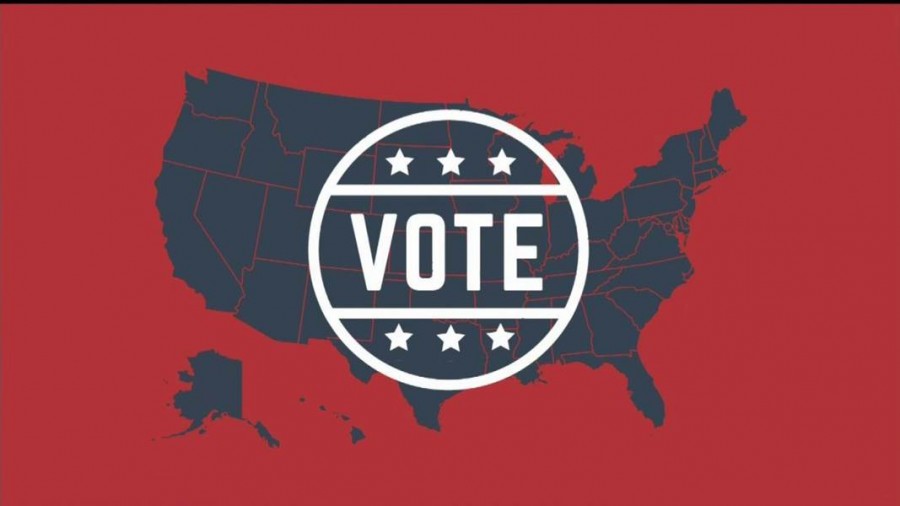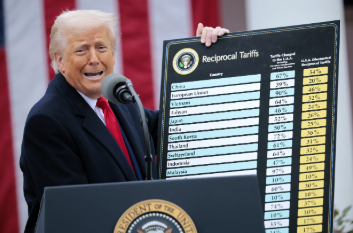Titanic Tuesday
March 15th was a very important deciding day for the future of the 2016 Presidential Election.
Whether you call it “Titanic Tuesday”, “Super Tuesday 2”, or just Tuesday, March 15th was a memorable day in the race for the Presidential nomination. Five states hold their primaries on March 15th; Florida, Illinois, Missouri, North Carolina, and Ohio. The Republican candidates involved in the March 15th primary were Donald Trump, Marco Rubio, John Kasich, and Ted Cruz. The Democratic candidates involved were Bernie Sanders and Hillary Clinton.
On the Democratic side, trade was a major issue prior to the primary. Clinton had just lost Michigan  in the March 8th primary, a big deal because Michigan was seen as a key state that Clinton was predicted to win. Sanders had been pummeling Clinton because she supports the North American Free Trade Agreement (NAFTA), and she supports expanded trade with China. Clinton has fought back by promising to increase trade taxes on foreign steel imports, which would help a key industry in Ohio. To set the record straight about her thoughts on trade, Clinton responded with, “To every worker in Ohio, every worker across America, let me say this: If I am fortunate enough to be your president I will stand with you, I will have your back and I will stop dead in its tracks any trade deal that hurts America and American workers.” Clinton won all five states in the March 15th primary, and ended with a total of 1,132 delegates. Sanders ended March 15th with a total of 818 delegates, not far behind. However, Clinton has 467 superdelegates and Sanders has 26, out of the total 712 superdelegates.
in the March 8th primary, a big deal because Michigan was seen as a key state that Clinton was predicted to win. Sanders had been pummeling Clinton because she supports the North American Free Trade Agreement (NAFTA), and she supports expanded trade with China. Clinton has fought back by promising to increase trade taxes on foreign steel imports, which would help a key industry in Ohio. To set the record straight about her thoughts on trade, Clinton responded with, “To every worker in Ohio, every worker across America, let me say this: If I am fortunate enough to be your president I will stand with you, I will have your back and I will stop dead in its tracks any trade deal that hurts America and American workers.” Clinton won all five states in the March 15th primary, and ended with a total of 1,132 delegates. Sanders ended March 15th with a total of 818 delegates, not far behind. However, Clinton has 467 superdelegates and Sanders has 26, out of the total 712 superdelegates.

Superdelegates are party leaders, and they can switch candidates based on primary results.


Tuesday proved to be yet another successful primary day for business mogul Donald Trump. Trump took sizeable victories in four out of the five primary states at stake, leaving him with a net gain of 204 delegates to further his delegate count to 673 in total. Trump won big in North Carolina (40%), Missouri (41%), Illinois (39%), and Florida (46%). Ohio Governor John Kasich was able to pull off an imperative victory in his home state’s highly anticipated primary. Kasich finished with 46.8% of the vote, while Trump trailed with 35.6%. Kasich’s popularity and high approval rating amongst republicans enabled him to prevail in a must win state to prevent his resignation from the race. 2012 presidential hopeful and former governor of Massachusetts Mitt Romney spent a great deal of his time campaigning on behalf of the Ohio governor. In Florida, Senator Marco Rubio suffered a humiliating defeat to Trump after serving his state for 5 years in Washington. Following his loss, Rubio announced the termination of his campaign and announced his dropping out of the race. Despite numerous endorsements from establishment conservatives, Rubio was unable to amass a core following and stump the Trump. In his final speech, Rubio stated that, “America is in the middle of a real political storm, a real tsunami and we should have seen this coming,” while continuing his criticisms of front runner Donald Trump. With 1,059 delegates remaining, Donald Trump has 678, Senator Ted Cruz has 413, while Kasich stands at 143.
Your donation will support the student journalists of West Bloomfield High School. Your contribution will allow us to purchase equipment and cover our annual website hosting costs.
Avani Samandur is a junior who enjoys writing and expressing her opinions on pressing issues of the world. She believes that everyone should be informed...

Ari is a senior and this is his fourth year in Spectrum. He loves the school spirit at West Bloomfield High School, especially the attendance at sports...












